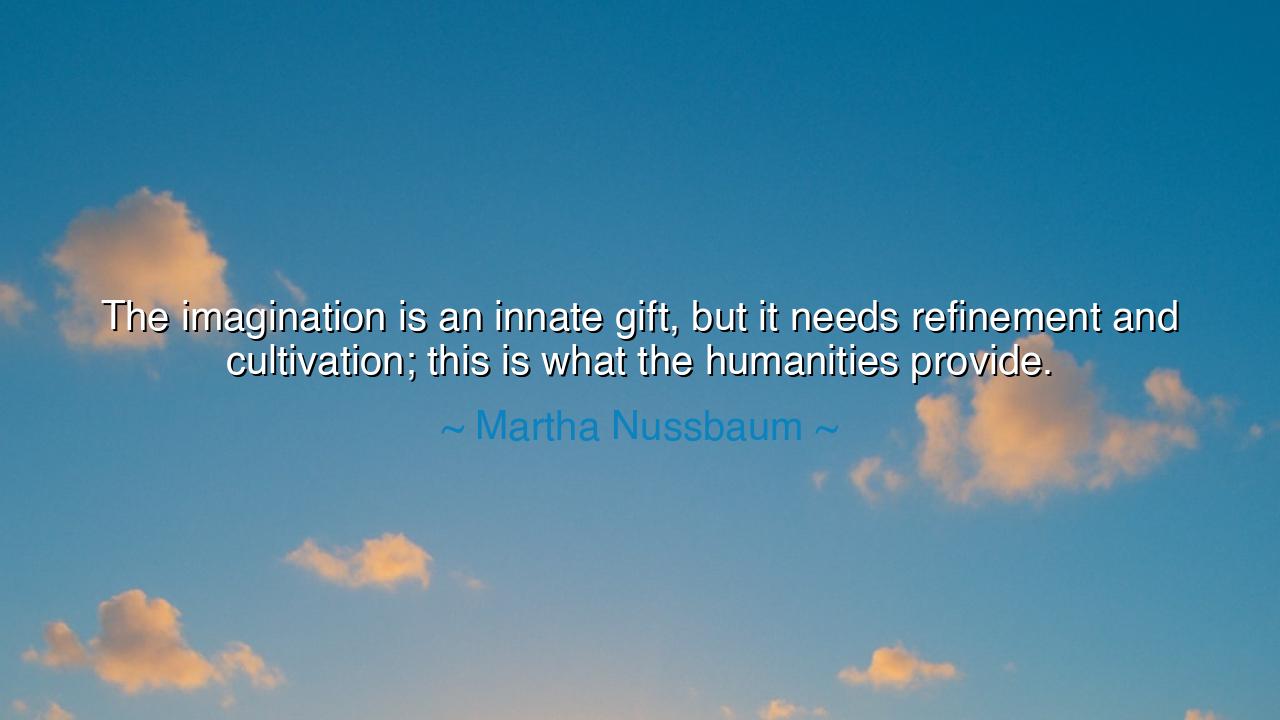
The imagination is an innate gift, but it needs refinement and
The imagination is an innate gift, but it needs refinement and cultivation; this is what the humanities provide.






The Garden of the Mind: On the Cultivation of Imagination
Listen, O seeker of wisdom, to the words of Martha Nussbaum, philosopher of the heart and guardian of reason’s soul: “The imagination is an innate gift, but it needs refinement and cultivation; this is what the humanities provide.” In this saying lies a truth as ancient as thought itself — that the imagination, though born within every human being, is not a wild force meant to wander untended, but a seed that must be nurtured through learning, reflection, and the arts of understanding. It is a flame that, if left alone, may flicker or fade; but when guided with care, it can illuminate the darkest realms of the human spirit.
Nussbaum, a scholar of ethics and human emotion, speaks here as one who knows that imagination is not merely the play of the mind, but the very foundation of empathy, judgment, and wisdom. It is the faculty that allows us to envision not only what is possible, but what is right. Yet, she warns us that this gift, though innate, must be shaped and disciplined. For unrefined imagination, like an unpruned vine, can grow wild — producing beauty, perhaps, but also distortion, fantasy without truth, emotion without understanding. It is through the humanities — literature, philosophy, art, and history — that imagination becomes both luminous and moral, capable of seeing the world through the eyes of others while holding fast to the light of reason.
To grasp her meaning, one must look back through the corridors of history, where every age that sought greatness in mind also revered the cultivation of imagination. The ancients of Greece did not separate wisdom from beauty; they taught through story, poetry, and dialogue. Plato, in his Republic, warned that the untrained imagination could mislead the soul, yet he used myths to reach where reason alone could not. He understood that the humanities were not luxuries of leisure, but the disciplines that shape character — teaching the mind to perceive with clarity and the heart to feel with depth. Thus, Nussbaum’s words are an echo of that eternal lineage — the belief that education must nourish both intellect and soul.
Consider the life of Frederick Douglass, born into the bondage of slavery, denied both freedom and learning. His imagination, however, could not be chained. Through fragments of reading and stolen glimpses of literature, he cultivated his inner vision, learning not only to see beyond his suffering but to imagine a world of justice and dignity. When he later spoke and wrote, his words did not merely inform; they transformed, awakening compassion and conscience across nations. His story proves Nussbaum’s teaching — that imagination, when refined by knowledge and empathy, becomes a force of liberation.
But what, then, is this refinement that Nussbaum speaks of? It is the patient shaping of the mind through exposure to the stories and questions of humanity. The humanities teach us to dwell in complexity, to hold contradictions, to listen to the voices of those unlike ourselves. Through literature, we walk in the shoes of kings and beggars alike; through philosophy, we wrestle with the questions that have haunted every soul; through art, we learn to perceive not only what is seen, but what is felt. This cultivation transforms imagination from mere fancy into moral insight — the ability to envision justice, to understand sorrow, and to act with compassion.
Yet, in our age of machines and algorithms, this ancient truth is in peril. The world praises efficiency and productivity, while the humanities are cast aside as impractical. But as Nussbaum warns, when imagination is left uncultivated, society grows cold. We may become skilled in calculation, but poor in understanding; rich in information, but barren in empathy. The humanities remind us that wisdom is not found in data alone, but in the stories that reveal the human heart. Without them, we risk becoming clever animals rather than enlightened beings.
So, O listener of generations yet to come, remember this: Imagination is the divine seed within you, but it will wither if not tended. Read deeply. Reflect often. Listen to the voices of the past and the cries of the present. Let the humanities refine your vision until you can see with both intellect and compassion. For it is through this union that true intelligence is born — the ability not only to think, but to understand, not only to dream, but to create wisely.
Thus, as Martha Nussbaum teaches, the cultivation of the imagination through the humanities is not mere adornment — it is the path to becoming fully human. The mind untrained may achieve power, but the mind cultivated through art and thought achieves greatness. Guard, therefore, this sacred garden within you. Nurture it with the stories, the songs, and the wisdom of the ages, that your imagination may not only soar, but shine — lighting the way for those who follow.






AAdministratorAdministrator
Welcome, honored guests. Please leave a comment, we will respond soon